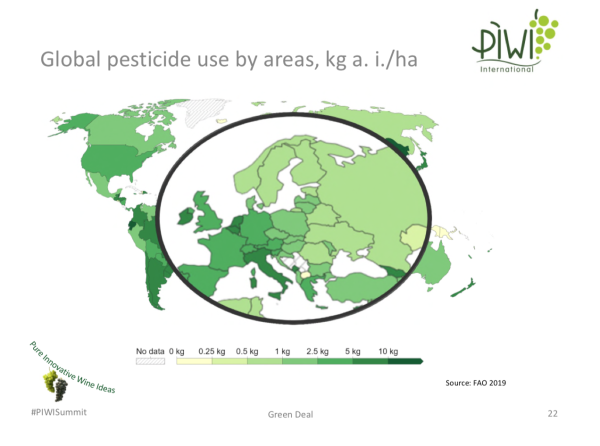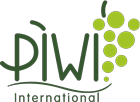 The Green Deal, the CRISPR-Cas technique and the resistance gene in the spotlight: Are we excited or not?
The Green Deal, the CRISPR-Cas technique and the resistance gene in the spotlight: Are we excited or not?
As PIWI representative in Spain, I was delighted to attend this first summit.
I took part with the aim of training myself, because resistant varieties are a new world that is opening up to us and I am convinced that it will represent the viticulture of the future.
I am happy to see this development:
- how the idea of crossing Vitis species with each other to make vines more resistant came about,
- in which countries these new varieties spread the most
- knowing that each new PIWI grape variety requires more than thirty years of research.
Climate change and the Green Deal are so topical and omnipresent that we now have to rethink and take the bull by the horns.
Although Spain's wine legislation does not yet provide for the cultivation of resistant varieties for commercial purposes, it is clear that this must change immediately.
PIWI International is represented and active throughout Europe and the response to these “NEW WINES” is spectacular, especially for their quality and sustainability; a must with regard to environmental protection and health.
With regard to the Green Deal, I was captivated by the lecture by Dr. Wolfgang Häussler, PIWI winemaker and EU advisor.
The F2F strategy (Farm to Fork) and the strategy to promote biodiversity for sustainable food production envisage a reduction in the use of pesticides by 50 % by 2030.
In order to achieve these goals, the following measures are required in the wine sector, among others:
- provide for the use of products and techniques to minimize toxicological and ecological risks,
- to keep the soil organically active and to promote biodiversity
- start the transition from growing traditional grape varieties to growing resistant varieties.
Opinions are divided on one topic: the CRISPR-CAS9 technique, which the EU considers suitable for speeding up the breeding of resistant varieties.
Some organic winegrowers do not find this “natural”, while the proponents consider it acceptable because no genetic modification per se takes place, but only the improvement of the resistant properties is worked out, which otherwise takes years of breeding.
I will not go into any more detail as all the presentations explaining these issues can be found in the members area of the PIWI International website.
The role of PIWI International in terms of communication and lobbying was explained in further presentations: With almost 1000 members in 30 countries, PIWI International is one of the largest international winegrowers' associations.
In order to strengthen the lobbying character of the association and to facilitate the exchange of knowledge between winegrowers, researchers and politicians in the wine sector, a comprehensive internal and external communication strategy has already been initiated.
Another incredible talk was given by Vitalie Popa, the Moldovan inventor of barrels that allow the winemaking and aging process to be completely free of preservatives and additives.
And last but not least, the lecture by Remo Räz from the biodynamic winery LENZ in Switzerland, who reported on their experiences with 12 PIWI red wine varieties and went into vinification and marketing of these PIWIs.
This case clearly showed us that PIWI brings about a drastic reduction in pesticide treatments, eliminates the need for copper and greatly reduces fuel consumption compared to traditional varieties.
The world is changing and it is time to act and bring nature back into our lives.
Together we can do anything.
We therefore invite you to actively participate in our community by sharing information and contributing your knowledge or experience.
Click here for the podcast with Wolfgang Häußler and Diego Weber (German)
Become a member: https://piwi-international.org/der-verein/mitglied-werden/
Karin Lundberg – PIWI Spain in January 2023
PS: Oh yes, I almost forgot to mention that the PIWI SUMMIT will take place quarterly. So make a note of the next date in your agenda: April 17, 2023 at 6:00 p.m.

